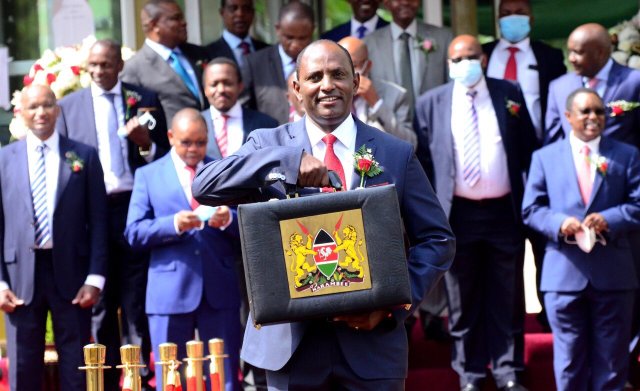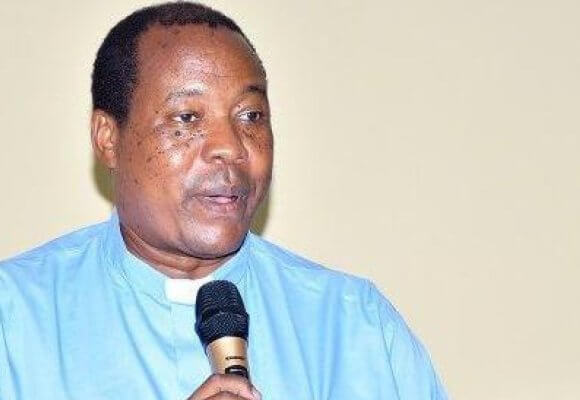|
LISTEN TO THIS THE AFRICANA VOICE ARTICLE NOW
Getting your Trinity Audio player ready...
|
Nairobi: One week after Treasury Cabinet Secretary Ukur Yatani’s 2022-2023 budget plan, Kenyans expressed mixed feelings about the government spending plan effectiveness.
Some are optimistic about the Sh 3.3 trillion national budget, while others have shown little hope of redeeming Kenya’s flagging economy.
Yatani has proposed hiking taxes on cosmetics and beauty products, tax on motorcycles, a hit on Boda Boda bussiness industry and a modest tax increase on water.
Deputy President William Ruto trashed the spending plan and vowed to change it within three months if he becomes president. Ruto took issue with some proposals that appear to levy basic commodities.
Duncan Oloo, a graduate of primary school teachers’ college, is a happy soul. Oloo, a native of Homa Bay who teaches at a private school in Mombasa’s Bamburi neighborhood.
“I graduated from Shanzu TTC in 2012, and I have been anticipating a government job for ages. I have moved from one academy school to another, trying to get greener pastures, but it seems that the situation is almost similar everywhere I go,” Oloo said.
His experience notwithstanding, he said this year’s budget gives him a glimmer of hope.
“The government allocated record billions to facilitate teachers recruitment. I hope and believe that I’ll be among the cohort that will be employed,” Oloo said.
The budget highly prioritized education. The sector was allocated Sh544.4 billion. Sh12 billion of this will be dedicated to the Free Primary Education program, and Sh2.5 billion will be used to recruit teachers.
Kenya is in the last mile of transitioning from the 8-4-4 education program that has been in effect since 1985 to the Competency-Based Curriculum.
Despite annual recruitment, Kenya has a shortage of teachers at primary and secondary schools levels.
As of 2015, the pupil-teacher ratio in primary school was 30.7 pupils per teacher. Nonetheless, the pupil-teacher ratio in primary education has fluctuated substantially in recent years.
According to the Global Economy website, the global average pupil-teacher ratio at the primary school level is 22.87.
I watched the budget being read in Parliament yesterday. I was not surprised by the big numbers which on the face value look rosy, but in essence, translate into nothing of benefit for common mwananchi.
–Monica Juma, small businesswoman.
Monica Juma, a large-scale seller of groceries and fruits in Kisii, said the budget won’t change “the hell that Kenya has become.” Juma buys fruits and vegetables from Western Kenya and Gusii region and sells them in Nairobi and Mombasa.
“I watched the budget being read in Parliament yesterday. I was not surprised by the big numbers which on the face value look rosy, but in essence, translate into nothing of benefit for common mwananchi,” Juma said.
She decried how her business has suffered and is struggling to stay in operation.
“The cost of living in this country is rising higher and higher, and no one seems to care. The cost of traveling around looking for my stock and transporting them to Nairobi and the Coast has spiked since the year started. I wish the government could have looked at the real issues troubling us,” Juma said.
The Kenya National Bureau of Statistics, in its March report, showed that the cost of living increased by 5 percent. The cost of fuel has also been rising since January. A liter of petrol retailing at around Ksh 100 a month ago, retails at around Ksh 150, with some retailers selling the commodity at for Ksh 200 a liter. Consequently, there has been a general rise in essential items and a steep increase in transportation costs.
Despite the economy’s status quo, Yatani told Citizen TV that he believes he has done a good job as the Minister for Treasury. While reading the budget on Thursday, Yatani said that the country’s economy is estimated to settle at 6 percent in 2022, bolstered by a recovery in the agriculture, industry, and service sectors.
“In 2022, the economy is projected to stabilize at 6.0 percent supported by the prevailing stable macroeconomic environment, favorable weather conditions to support agricultural output and drive food processing (manufacturing) and the continued recovery in industry and services,” the CS Yatani said.
Steve Biko, a university student, based in Eldoret, said he thinks the government is unnecessarily spending too much on the military.
“We are not in a war-torn country; this is not Russia, Ukraine, or Somalia where we are faced with a constant enemy. The billions allocated to the ministry of defence should have been cut down and channeled to job creation and subsidies that can help my mother in rural Tesoland,” Biko said.
The budget has the security sector allocated Sh317.8 billion. The money is meant to be shared between the National Police Service (NPS), Defence, and National Intelligence Service (NIS).
In 2022, the economy is projected to stabilize at 6.0 percent supported by the prevailing stable macroeconomic environment, favorable weather conditions to support agricultural output and drive food processing (manufacturing) and the continued recovery in industry and services.
-Treasury Cabinet Secretary Ikur Yatani said.
The defense got Sh128.4 billion, while the National Intelligence Service was allocated Sh46.4 billion. The police and prison service were allotted Sh122.2 billion.
Gladys Moraa let farmers down by not reducing the tax on farm inputs.
“This country relies on agriculture to run and feed its people. Yet, fertilizer, seeds, and other basic necessities of the sector are highly taxed. How do they expect us to survive? I thought that the CS would come with good news about reduction of such retrogressive taxes,” she offered.
In January, the fertilizer price, a core farming component, went up by double, from an average of Sh 3000 to Sh 6000 a bag. However, about a week ago, the agriculture ministry reverted the price to the former Sh 3000.
“Rainy season has started. Most small-scale and large-scale farmers have already begun preparing their farms for planting. I, therefore, urge every farmer to take advantage of the reduced prices and purchase their preferred fertilizer,” said Peter Munya, the Cabinet Secretary for Agriculture.
Still, Moraa reads malice in reducing the fertilizer prices, saying the move is political and discriminatory.
“Why are they lowering the price after some parts have already planted maize and other crops? In the Gusii region, the planting season is over, and therefore we won’t benefit from the affordable price,” Moraa said.






























LEAVE A COMMENT
You must be logged in to post a comment.